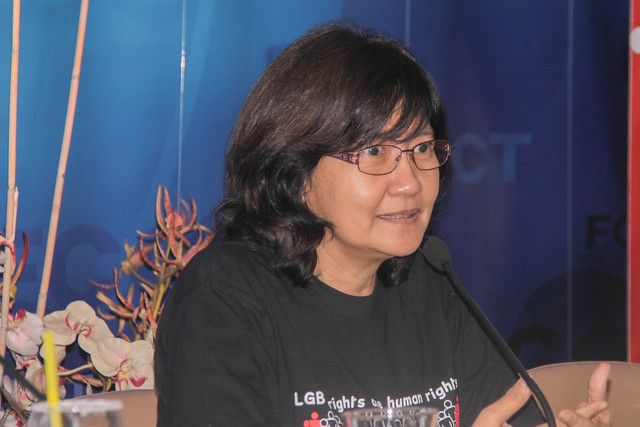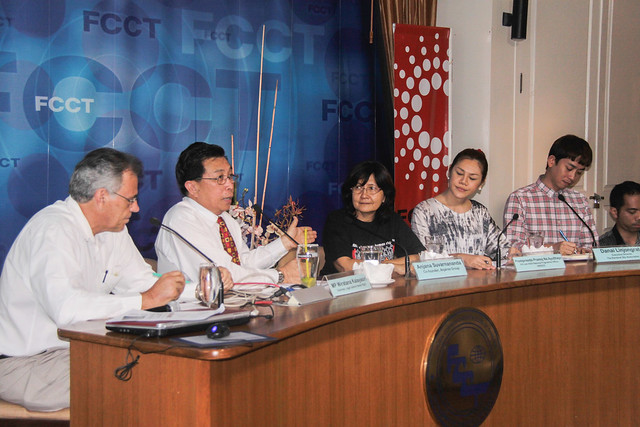The parliament appointed by the military junta is expected to pass the Civil Partnership Act, the first law in Thailand to recognize the existence of same-sex couples. However, the bill is widely unacceptable to lesbian, gay, bisexual and transgender (LGBT) activists, who say that although the bill allows for greater equality, it still discriminates against gay people. And most importantly, deliberation of the bill is expected to be rushed, without public participation, by the so-called the “rubber stamp” National Legislative Assembly (NLA).
The bill defines “civil partnership” as “two persons of same sex who have registered under the bill,” and stipulates that the rights of a person in a civil partnership will include the right to use one’s surname, property rights between the partners and rights on how the partnership is ended.
Superficially, civil partnerships seem to enjoy the same rights and status as heterosexual marriages under the Family Act. However, when looked at in detail, the bill does not entitle homosexual partners to raise children. Moreover, the minimum age of those allowed to register civil partnerships is 20, while for the heterosexual marriage it is 17.
Unlike the Civil Solidarity Pact in France, which allows either opposite-sex or same-sex couples to register for civil partnerships, Thailand’s draft civil partnership bill is for homosexual couples only.
Anjana Suvarnananda, Executive Director of Anjaree.org, spoke at the FCCT in 2013 about why the revision of the Family Law codified in Civil and Commercial Law would be significant for true marriage equality. (file photo)
Anjana Suvarnananda, head of
Anjaree and a renowned LGBT rights campaigner in Thailand, considers this bill as yet another form of discrimination, which puts homosexual couples into a different category and as a result, they enjoy different rights from opposite-sex couples.
According to Somchai Preechasilpakul, Associate Professor at Chiang Mai University’s Faculty of Law, same-sex couples registered under the Civil Partnership Bill will not be able to enjoy the rights under the Civil and Commercial Code enjoyed by opposite-sex couples, whose marriages are registered under the Family Law, which is a part of the Code. In short, there is a need to amend the Civil and Commercial Code if the gay couples want to enjoy the same rights.
Anjana thinks that the true equality in marriage and family life will be achieved by revising the Civil Code, so that it recognizes all kinds of families and forms of relationships.
“If civil partnership registration has never existed in the Civil Code before, how are they going to figure out actual practice?” she asked, admitting that changing the Civil and Commercial Code will not be easy.
However, Kertchoke Kasamwongjit, Specialist in Conflict Management for the Rights and Liberties Protection Department of the Ministry of Justice and the head of the law drafting team, dismissed these concerns, saying that the Civil Partnership Bill could lead to a revision of the Code.
"We wanted a bill that would be passed very easily. We’ve never had even one word mentioning LGBT people in laws before,” said the Justice Ministry specialist. “So if I could put this first "one word" into any kind of law, revision of the Civil and Commercial Code won't be impossible.”
However, Anjana says: “You know, we sometimes say ‘better than nothing’, but it’s our own society. Changes take time, therefore discussions are very important as a first step.”
Despite the controversial details, the Justice Ministry plans to submit the draft bill soon, according to Kertchoke. This is a result of the military government’s order last week to have more draft bills from ministries submitted to the NLA for deliberation.
Moreover, the Justice Ministry plans to finish drafting ministerial regulations for the Ministry of Interior on registering civil partnerships by Friday to be submitted together with the draft bill, the official said. (The Interior Ministry is responsible for marriage registration.)
In the normal legislative process in Thailand, ministerial regulations related to an Act are drafted after the bill is passed. However this time, Kertchoke said the ministerial regulations must come together with the bill in order “not to waste time”.
The panel discussion on "Could Thailand become the first Asian country to legalize same-sex civil unions?" was held at the Foreign Correspondents' Club of Thailand (FCCT) on July 17, 2013. Panelists from several LGBT organizations—such as Anjaree and Thai Rainbow Association Thailand (RSAT)—and Wiratana Kalayasiri, former Democrat MP, talked about how the civil partnerships should be registered in the kingdom. (file photo)
“This is the second time I have tried to propose a registration bill,” said Kertchoke who has been working for marriage equality in Thailand for several years. “I’m still not sure what the result is going to be, but let’s give it a try.”
During the previous civilian government, after the Justice Ministry held five public hearings across the country, this bill was put before the Lower House in October 2013, with the support of opposition Democrat MP Wiratana Kalayasiri.
However, because of opposition from LGBT activists who criticized the bill for not reflecting the views and demands of LGBT communities, the process was halted until there was a coup d’état on May 22.
Because of discontent with the bill, the leading LGBT organizations in Thailand, such as the
Foundation for SOGI Rights and Justice (FOR SOGI), started drafting their own bill last year and planned to submit it by the means allowed by the 2007 Constitution. The biggest difference in FOR SOGI’s bill is that all the couples are eligible, regardless of gender, while Kertchoke’s bill is for same-sex couples only.
Chantalak Raksayu from FOR SOGI said the organization opposed Kertchoke’s bill before the coup and will continue doing so.
The 2014 Interim Constitution makes it even harder for the group to work on a parallel draft bill since the charter does not allow citizens to submit draft laws. But FOR SOGI said they do not care much.
“I don’t think we will propose it (the bill) now,” Chantalak said. “They (junta) violate human rights, but what we are doing is exactly about human rights. Instead, we are going to make people aware of the importance of this law.”
The head of Anjaree is also concerned with the current political situation, especially the legislative process.
“Whether the bill goes to the assembly (NLA) or not is not an issue for me. I don’t know who the people in the assembly are,” said Anjana “They are not my representatives. It is sad to see such an important bill being processed and passed without adequate people's participation.”
“So if the bill is passed, I don't feel it is my law.”



